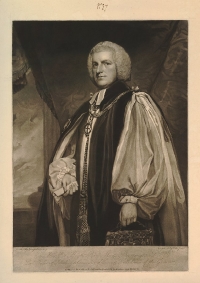
After 1066 William the Conqueror struggled to bring peace to his new kingdom. His arrival with his army was usually sufficient for rebels to bend the knee and swear fealty to their liege lord, accepting any patronage that was on offer, but no sooner had he moved on to the next disturbance than they would revert to their rebellious ways. Especially was this true in the North where poor roads prevented the swift retaliation to uprisings which had been the Roman hallmark. By 1069 William’s patience was at an end and as the rebels would not face him in pitched battle, he determined to lay waste to large areas of Northern England, to put down the rebels by terror and famine. As a longer term solution to northern plotting and uprisings and Scottish encroachment into his kingdom, William conceived of a semi-
autonomous buffer state in Northumbria and Durham which would be ruled by what came to be known as the Prince Bishops of Durham. They were given taxation powers and mineral rights and in return were expected to raise an army to maintain order. The surplus in their exchequer belonged to them in their own right, not as trustees for church or state, and consequently, like the King in London, they lived in some style. In 1154 King Stephen confirmed the grant of all the mineral rights in Weardale to the Prince Bishops, and to the present incumbent, his nephew, Hugh de Puiset (“Nepotism” is derived from the word “nephew” and comes from the former papal practice of elevating their nephews to be cardinals as they could have no legitimate sons of their own). From 1154 to 1836, when the last Prince Bishop, William van Mildert, relinquished his powers, the Weardale mineral rights remained with the Prince Bishops and brought them fabulous wealth when mining was profitable. (In 1836 the mineral rights were vested in the Commissioners of the Church of England and remain with them to this day.)
The second to last Prince Bishop was John Shute Barrington who held office between 1791 and 1826, when he died aged 91. In investment circles, a mine is sometimes defined as a hole in the ground with a liar standing next to it, so often do

they come to nothing for their backers. An equally good definition for mines in Weardale would be a hole in the ground surrounded by lawyers arguing over their clients’ interests. The Bishop of Durham and the Rector of Stanhope were in frequent legal spats with those to whom they had given licences to operate mines (The Rector of Stanhope had an ancient right to a tithe or a tenth of all the ore mined, making the benefice of Stanhope the richest in the whole of England). When Barrington was appointed to the See of Durham, he agreed a rental of £900 per year with the agent of the Beaumont Mining Company for the land mined by the latter. When it became clear to Barrington that he had been hoodwinked and that the Beaumonts had got the rights at a fraction of their true value, he instigated legal proceedings. An out of court settlement was eventually reached whereby Barrington received about £60,000. In 1819, motivated by a genuine interest in the moral and religious training of the poor, and fearing the establishment of Methodist and Quaker schools in the heavily populated mining villages of Weardale, Barrington used some of the proceeds of the legal settlement to buy land in Wearhead, Heathery Cleugh (Cowshill), Boltsburn (Rookhope) and Stanhope and there he built his schools. Additionally, he replaced existing charity schools at St John’s Chapel, Westgate and Eastgate and so had seven schools in Weardale under his guidance. He also set aside investment funds the income from which would pay the running costs of the schools.

The following are some of the regulations of the Barrington Schools:
That the masters of the schools “must be members of the Church of England, and regular attendants on Divine Service… and at no other place of worship”.
“That the annual examinations be holden in the months of December and January: that the washer boys, or such other children as are absent during the summer months, may attend.”
“That the children of every denomination be admitted into these schools, on paying the stipulated quarter pence”.

“That the children who are instructed in these schools be required to attend the church twice every Sunday, where they have an opportunity to do so”.
“That the school masters appoint monitors to attend both morning and evening services on Sunday, to distribute tickets to the children present after service, which tickets the children shall deliver to the schoolmasters on Monday mornings”.
“That seven loads of coal be provided for each school; the masters to provide more if wanted”.
“That twelve free scholars be allowed for each school, and that all the children in the workhouse be sent free by the committee”.
“That the schoolmasters read prayers every morning at half-past eight and every evening at five o’clock”.